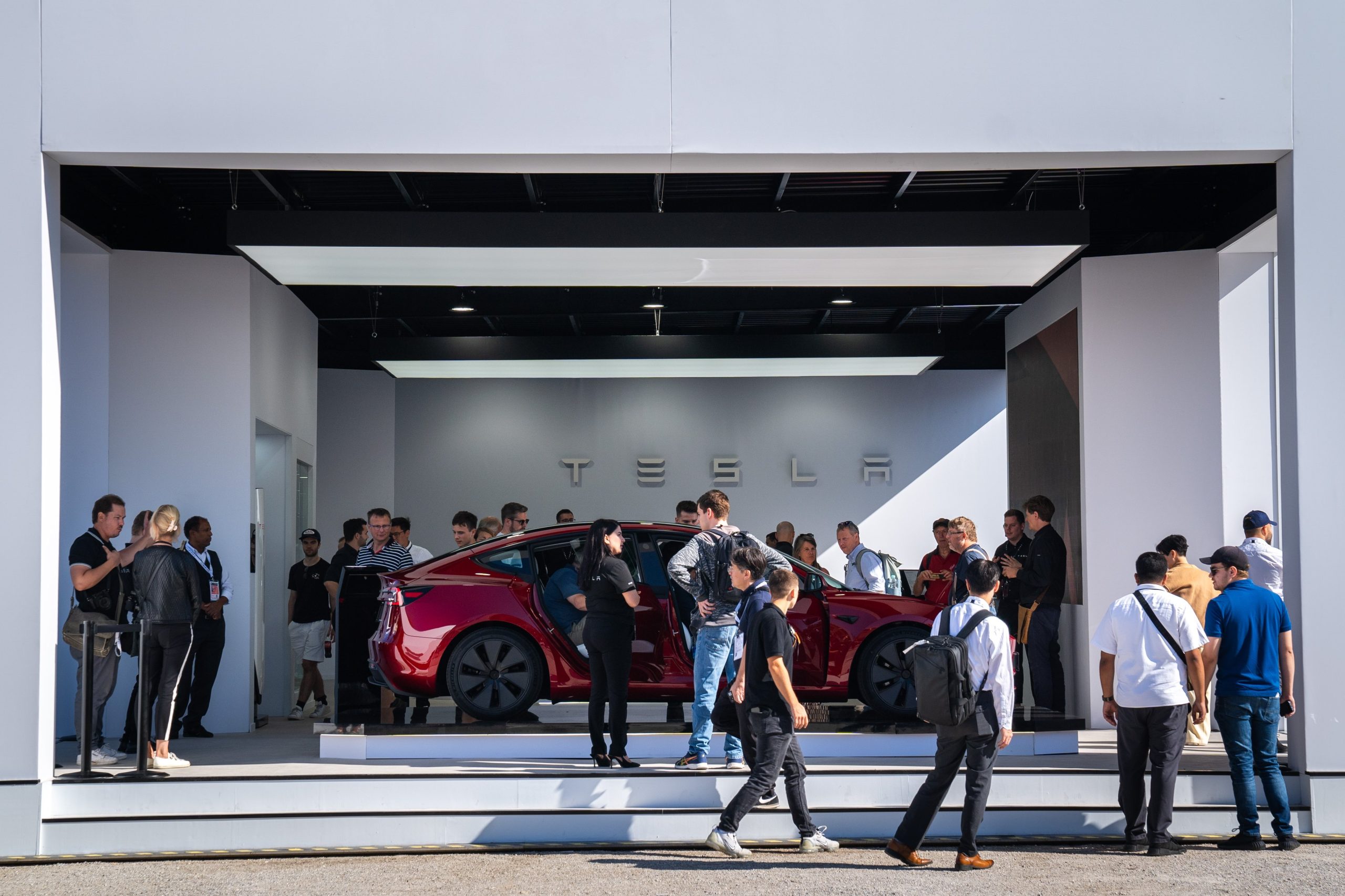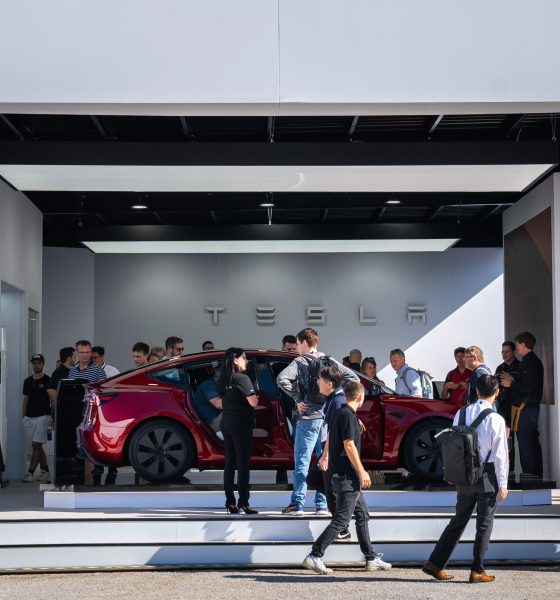

News
Tesla has filed a petition with Wisconsin to allow direct car sales
Tesla has filed an official petition with the state of Wisconsin to let the company sell cars directly to consumers, coming as the latest in the company’s attempts to overturn direct sales bans across several U.S. states.
After Tesla officially filed the petition with the Outagamie County Circuit Court last month, the court has received responses from multiple parties in filings earlier this month. Such parties include the Wisconsin Department of Transportation and the Wisconsin Automobile and Truck Dealers Association, and the court has officially set a hearing date on the petition.
Currently, Wisconsin is just one of many states in which Tesla buyers must drive out of state to purchase and pick up one of the company’s vehicles, due to laws requiring automakers to sell vehicles through a dealership. While Tesla, Rivian and other direct sales companies have gained some ground in overturning these laws, many states including Wisconsin still prohibit the model.
The Circuit Court has set a motion hearing for the case for March 24. The case number for for Tesla, Inc. vs. Wisconsin Department of Transportation et al is 2025CV000075, and you can see the case filing here on the Wisconsin courts website.
READ MORE ON DIRECT SALES LAWS: Tesla granted license for direct vehicle sales in Kentucky
Across the U.S., there are 22 different states that either have active bans on direct vehicle sales or limitations on how many stores direct sales automakers like Tesla can open. The efforts to overturn such bans last year gained some ground in Kentucky, where Tesla was granted a license for direct sales in August, as well as in Louisiana, where an appeals court backed the company in its right to sue the state over dealership laws.
Other automakers such as Lucid Motors, Rivian and, more recently, Volkswagen’s new venture Scout Motors have faced opposition from dealers and dealership lobbying groups such as the aforementioned Wisconsin Automobile and Truck Dealers Association, ultimately upholding the bans in several states.
Some other states that don’t have bans on direct vehicle sales, such as Florida, have also introduced new legislation in the past few years attempting to ban direct sales.
Below you can see which U.S. states still have direct vehicle sales bans in place, and which either limit stores or allow Tesla to sell direct-to-consumer through loopholes.
Which U.S. states still have bans on direct vehicle sales?
- Alabama (including service centers)
- Arkansas
- Connecticut (only leasing is allowed, and the company also uses a tribal land loophole)
- Iowa
- Kansas (including storefronts)
- Louisiana (Tesla uses special license with “service center” model as loophole)
- Nebraska
- New Mexico (including service centers, and the company also uses a tribal land loophole)
- Oklahoma
- South Carolina (includes service centers)
- Texas (Tesla gets online loophole with “service center” model)
- West Virginia (including storefronts)
- Wisconsin
U.S. states that limit the number of direct sales-eligible stores
- Illinois (limited to 13)
- Maryland (limited to 4)
- Mississippi (limited to 1)
- New Jersey (limited to 4)
- New York (limited to 5)
- North Carolina (limited to 6)
- Ohio (limited to 3)
- Pennsylvania (limited to 5)
- Virginia (limited to 5)
What are your thoughts? Let me know at zach@teslarati.com, find me on X at @zacharyvisconti, or send us tips at tips@teslarati.com.
Tesla loses direct sales lawsuit that aimed to fight stressful carbuying
Need accessories for your Tesla? Check out the Teslarati Marketplace:

Cybertruck
Tesla drops latest hint that new Cybertruck trim is selling like hotcakes
According to Tesla’s Online Design Studio, the new All-Wheel-Drive Cybertruck will now be delivered in April 2027. Earlier orders are still slated for early this Summer, but orders from here on forward are now officially pushed into next year:

Tesla’s new Cybertruck offering has had its delivery date pushed back once again. This is now the second time, and deliveries for the newest orders are now pushed well into 2027.
According to Tesla’s Online Design Studio, the new All-Wheel-Drive Cybertruck will now be delivered in April 2027. Earlier orders are still slated for early this Summer, but orders from here on forward are now officially pushed into next year:
🚨 Tesla has updated the $59,990 Cybertruck Dual Motor AWD’s estimated delivery date to April 2027.
First deliveries are still slated for June, but if you order it now, you’ll be waiting over a year.
Demand appears to be off the charts for the new Cybertruck and consumers are… pic.twitter.com/raDCCeC0zP
— TESLARATI (@Teslarati) February 26, 2026
Just three days ago, the initial delivery date of June 2026 was pushed back to early Fall, and now, that date has officially moved to April 2027.
The fact that Tesla has had to push back deliveries once again proves one of two things: either Tesla has slow production plans for the new Cybertruck trim, or demand is off the charts.
Judging by how Tesla is already planning to raise the price based on demand in just a few days, it seems like the company knows it is giving a tremendous deal on this spec of Cybertruck, and units are moving quickly.
That points more toward demand and not necessarily to slower production plans, but it is not confirmed.
Tesla Cybertruck’s newest trim will undergo massive change in ten days, Musk says
Tesla is set to hike the price on March 1, so tomorrow will be the final day to grab the new Cybertruck trim for just $59,990.
It features:
- Dual Motor AWD w/ est. 325 mi of range
- Powered tonneau cover
- Bed outlets (2x 120V + 1x 240V) & Powershare capability
- Coil springs w/ adaptive damping
- Heated first-row seats w/ textile material that is easy to clean
- Steer-by-wire & Four Wheel Steering
- 6’ x 4’ composite bed
- Towing capacity of up to 7,500 lbs
- Powered frunk
Interestingly, the price offering is fairly close to what Tesla unveiled back in late 2019.
Elon Musk
Elon Musk outlines plan for first Starship tower catch attempt
Musk confirmed that Starship V3 Ship 1 (SN1) is headed for ground tests and expressed strong confidence in the updated vehicle design.

Elon Musk has clarified when SpaceX will first attempt to catch Starship’s upper stage with its launch tower. The CEO’s update provides the clearest teaser yet for the spacecraft’s recovery roadmap.
Musk shared the details in recent posts on X. In his initial post, Musk confirmed that Starship V3 Ship 1 (SN1) is headed for ground tests and expressed strong confidence in the updated vehicle design.
“Starship V3 SN1 headed for ground tests. I am highly confident that the V3 design will achieve full reusability,” Musk wrote.
In a follow-up post, Musk addressed when SpaceX would attempt to catch the upper stage using the launch tower’s robotic arms.
“Should note that SpaceX will only try to catch the ship with the tower after two perfect soft landings in the ocean. The risk of the ship breaking up over land needs to be very low,” Musk clarified.
His remarks suggest that SpaceX is deliberately reducing risk before attempting a tower catch of Starship’s upper stage. Such a milestone would mark a major step towards the full reuse of the Starship system.
SpaceX is currently targeting the first Starship V3 flight of 2026 this coming March. The spacecraft’s V3 iteration is widely viewed as a key milestone in SpaceX’s long-term strategy to make Starship fully reusable.
Starship V3 features a number of key upgrades over its previous iterations. The vehicle is equipped with SpaceX’s Raptor V3 engines, which are designed to deliver significantly higher thrust than earlier versions while reducing cost and weight.
The V3 design is also expected to be optimized for manufacturability, a critical step if SpaceX intends to scale the spacecraft’s production toward frequent launches for Starlink, lunar missions, and eventually Mars.
News
Tesla FSD (Supervised) could be approved in the Netherlands next month: Musk
Musk shared the update during a recent interview at Giga Berlin.

Tesla CEO Elon Musk shared that Full Self-Driving (FSD) could receive regulatory approval in the Netherlands as soon as March 20, potentially marking a major step forward for Tesla’s advanced driver-assistance rollout in Europe.
Musk shared the update during a recent interview at Giga Berlin, noting that the date was provided by local authorities.
“Tesla has the most advanced real-world AI, and hopefully, it will be approved soon in Europe. We’re told by the authorities that March 20th, it’ll be approved in the Netherlands,’ what I was told,” Musk stated.
“Hopefully, that date remains the same. But I think people in Europe are going to be pretty blown away by how good the Tesla car AI is in being able to drive.”
Tesla’s FSD system relies on vision-based neural networks trained on real-world driving data, allowing vehicles to navigate using cameras and AI rather than traditional sensor-heavy solutions.
The performance of FSD Supervised has so far been impressive. As per Tesla’s safety report, Full Self-Driving Supervised has already traveled 8.3 billion miles. So far, vehicles operating with FSD Supervised engaged recorded one major collision every 5,300,676 miles.
In comparison, Teslas driven manually with Active Safety systems recorded one major collision every 2,175,763 miles, while Teslas driven manually without Active Safety recorded one major collision every 855,132 miles. The U.S. average during the same period was one major collision every 660,164 miles.
If approval is granted on March 20, the Netherlands could become the first European market to greenlight Tesla’s latest supervised FSD (Supervised) software under updated regulatory frameworks. Tesla has been working to secure expanded FSD access across Europe, where regulatory standards differ significantly from those in the United States. Approval in the Netherlands would likely serve as a foundation for broader EU adoption, though additional country-level clearances may still be required.








